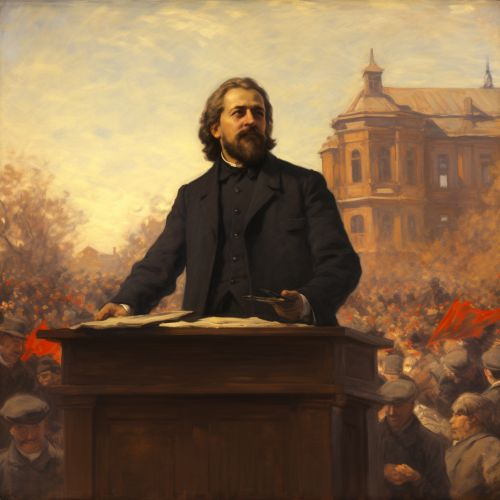Communist Party
Origins and Early History
The Communist Party is a political party that advocates for the establishment of a society in which property is publicly owned and each person works and is paid according to their abilities and needs. The concept of communism can be traced back to ancient times, but the modern communist movement began in the 19th century with the works of Karl Marx and Friedrich Engels.
Marx and Engels outlined their ideas in "The Communist Manifesto" in 1848. They believed that the struggle between the bourgeoisie (the capitalist class who own most of society's wealth and means of production) and the proletariat (the working class) would eventually lead to a revolution. This revolution would result in the establishment of a classless, stateless society where the means of production are owned by the community as a whole.


Formation of Communist Parties
The first major communist party was the Russian Social Democratic Labour Party, which later split into the Bolsheviks and Mensheviks. The Bolsheviks, led by Lenin, seized power in Russia during the October Revolution of 1917 and later became the Communist Party of the Soviet Union.
The success of the Bolsheviks inspired the formation of communist parties in other countries. In China, the Communist Party of China was founded in 1921 and eventually came to power in 1949 under the leadership of Mao. In Cuba, the Communist Party of Cuba was established in 1965, several years after Fidel Castro's revolution overthrew the Batista regime.
Ideology and Principles
Communist parties adhere to Marxist-Leninist ideology, which includes the principles of dialectical materialism, class struggle, and proletarian internationalism. They believe in the abolition of private property and the establishment of a planned economy where production is controlled by the state. They also advocate for the rights of workers and the establishment of a classless society.
Impact and Influence
Communist parties have had a significant impact on global politics and economics. The policies implemented by these parties have led to significant changes in the countries where they have held power. For example, the Soviet Union's planned economy and emphasis on heavy industry transformed it into a global superpower. Similarly, China's economic reforms under the Communist Party have resulted in it becoming one of the world's largest economies.
Criticisms and Controversies
Communist parties have been criticized for their authoritarian tendencies and violations of human rights. Critics argue that the concentration of power in the hands of the state leads to corruption and abuses of power. There have also been concerns about the economic viability of planned economies, with critics pointing to economic stagnation and inefficiencies in countries under communist rule.
Legacy and Current Status
Despite the collapse of many communist regimes in the late 20th century, several communist parties remain in power today, including in China, Cuba, Laos, and Vietnam. These parties continue to have a significant impact on global politics and economics.
